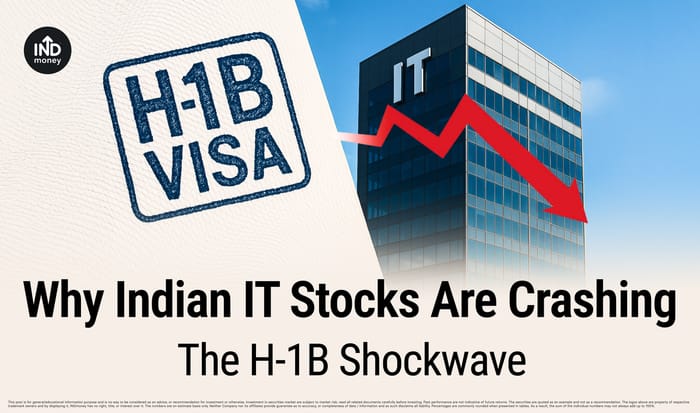
- The Trigger: H-1B Visa Fee Hike
- What Is the H-1B Visa and Why Does It Matter
- Market Reaction: Sharp Sell-off in IT Stocks
- Implications for IT Companies
- Conclusion
In the fast-moving world of Indian IT, even a single policy shift abroad can trigger ripple effects at home. On 22 September 2025, U.S. regulatory changes impacted not just individual companies but the broader Nifty IT index, and the stock movement reflects real pressures, not just market sentiment.
The sector came under sharp selling pressure, with the Nifty IT index sliding 2.9%, underperforming the broader market. Giants like TCS, Infosys, HCL Tech, and Wipro all saw meaningful declines as investors reacted to the new policy.
Let’s look at the latest news triggering this market reaction, its impact on IT companies, and the challenges that lie ahead for businesses and investors.
The Trigger: H-1B Visa Fee Hike
- The Trump administration’s decision to raise the H-1B visa application fee to $100,000 for new applications, effective Sunday, 21 September 2025, has sent shockwaves through the Indian IT sector.
- The fee is a one-time charge applicable only to new visa applications filed after September 21, 2025. Existing H-1B holders, including those temporarily outside the U.S., are not affected when re-entering the country. There’s no need for current employees to rush to travel to avoid the fee.
- This policy particularly impacts companies like TCS, Infosys, Wipro, and HCLTech, which rely heavily on sending engineers to client locations in the U.S. under H-1B visas.
What Is the H-1B Visa and Why Does It Matter
- The H-1B visa is a non-immigrant work permit that allows U.S. employers to temporarily hire foreign workers in specialized occupations requiring a bachelor’s degree or equivalent experience. It is the primary pathway for U.S. companies to bring in highly-skilled international talent, especially in technology and knowledge-driven sectors, to fill domestic skill gaps.
- For the Indian IT sector, the H-1B visa is crucial. A significant portion of Indian IT professionals working in the U.S. are deployed under this program as part of a hybrid offshore–onsite delivery model:
Offshore work: Most development, coding, testing, and support is done in India, ensuring cost efficiency and scalability.
On-site work: A smaller team works at client locations (mainly in the U.S. or Europe) for direct interaction, project management, and maintaining client proximity and operational flexibility. - This model relies heavily on H-1B visas to balance cost, efficiency, and on-site presence. Any disruption to the visa program raises costs, threatens operational flexibility, and impacts margins for the majority of IT companies.
- Most major IT companies, including Infosys, Wipro, TCS, and HCL, maintained H-1B approval rates of 98–99% in FY 2024, highlighting their ability to deploy engineers to the U.S. and their reliance on the visa program.
- TCS had 1,452 H-1B visa petitions approved in FY 2024, up approximately 24% from approvals in FY 2023, while HCL’s approvals nearly doubled to 1,248, reflecting expanding U.S. business
- Denial rates remain low, typically 1–2%, which makes the recent fee hike a cost pressure concern rather than a deployment risk
Market Reaction: Sharp Sell-off in IT Stocks
Markets reacted swiftly, as investors priced in the potential cost escalation for Indian IT majors, leading to a sector-wide decline.
- Major IT companies saw sharp drops: TCS fell 3% intraday, Infosys slipped 2.6%, HCL Tech opened 2.5% lower, and Wipro declined 2.37%.
- Other IT players also fell, with Tech Mahindra down 3.65% and LTIMindtree Ltd dipping 3.9% intraday.
For investors, the key concern is that higher overseas deployment costs could squeeze margins and weaken earnings visibility.
Implications for IT Companies
The visa fee hike is more than just a short-term cost increase; it poses strategic challenges:
- Margin erosion: On-site projects in the U.S. will get more expensive. Companies may try to renegotiate contracts or shift more work offshore, but that risks losing competitiveness.
- Local hiring: Instead of sending engineers from India under H-1B visas, the companies may hire talent already in the U.S., reducing visa dependence, though this approach is costlier than offshore deployment.
- Geographic diversification: To reduce reliance on U.S. H-1B visas, Indian IT companies may increasingly hire talent closer to client locations, in countries like Canada or Latin America, helping maintain client proximity and ensure smoother project delivery.
Conclusion
The sell-off in TCS and other Indian IT majors underscores the sector’s sensitivity to global policy shifts. The H-1B visa fee hike is a short-term headwind, increasing onsite staffing costs and pressuring margins. Investors should watch how companies manage costs, rebalance their offshore–onsite mix, and maintain U.S. client confidence.
Short-term volatility is expected as the sector adjusts to higher costs. Indian IT companies can navigate these challenges through automation, offshoring, and selective local hiring, while strong global demand for digital transformation, cloud, and AI services supports ongoing growth.
Strong execution and strategic adaptability will determine which firms emerge stronger, while visa-related hurdles are likely temporary, and future performance will depend on how companies respond.
Disclaimer
Investments in the securities market are subject to market risks, read all the related documents carefully before investing. The securities are quoted as an example and not as a recommendation.This is nowhere to be considered as an advice, recommendation or solicitation of offer to buy or sell or subscribe for securities. INDStocks SIP / Mini Save is a SIP feature that enables Customer(s) to save a fixed amount on a daily basis to invest in Indian Stock. INDstocks Private Limited (formerly known as INDmoney Private Limited) 616, Level 6, Suncity Success Tower, Sector 65, Gurugram, 122005, SEBI Stock Broking Registration No: INZ000305337, Trading and Clearing Member of NSE (90267, M70042) and BSE, BSE StarMF (6779), SEBI Depository Participant Reg. No. IN-DP-690-2022, Depository Participant ID: CDSL 12095500, Research Analyst Registration No. INH000018948 BSE RA Enlistment No. 6428. Refer https://indstocks.com/pricing?type=indian-stocks; https://www.indstocks.com/page/indian-stocks-sip-terms-and-condition for further details.